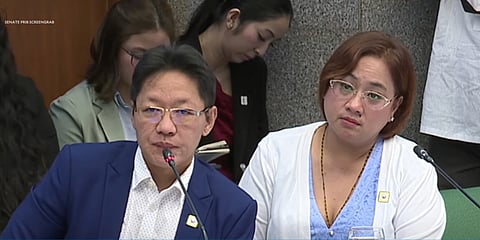Sarah Discaya, London ex-chambermaid, now a 'protected witness' amid Philippine mega kickbacks probe: What it means
Sarah Discaya and husband Curlee seen behind fake flood control projects, mega-kickbacks

Manila: A former chambermaid in London at the centre of multi-billion-dollar flood control mess in the Philippine has become a "protected witness" by the Department of Justice (DOJ) amid a probe that has rocked the Asian nation.
Sarah Discaya, a dual British-Filipino citizen, and her husband Pacifico "Curlee" Discaya, have emerged from being jobless in Pasig to the top ranks of construction in the country.
Together, the power couple are reportedly in control of at least 9 contracting companies.
Their companies have snagged major flood control projects, now subject to a probe amid charges of unprecedented kickbacks and ghost projects.
Local media channel Bilyonaryo reported that the Anti-Money Laundering Council (AMLC) has frozen 77 bank accounts of St. Timothy Construction, a company controlled by the couple.
115,000% surge in fund inflows, mostly from DPWH
The accounts have seen a total of ₱48.3 billion ($829 million) in total inflows since 2016. It had 9,975 transactions, with the single-largest transactionamounting to ₱571.55 million.
From 2016 to 2019, fund inflows surged by a whopping 115,000%, with about 80% of its funds or ₱38.65 billion ($663 million) coming from the Department of Public Works and Highways (DPWH).
Graft and plunder cases had been file against least 20 DPWH former employees by the Philippine government in relation to the scam. Details of the plunder that emerged from the livestreamed probe have angered Filipino taxpayers.
Protected vs state witness
Under Philippine law, a "protected witness" is given government protection primarily for their safety.
These following definitions clarify the roles and protections under Republic Act (RA) No. 6981 (Witness Protection, Security and Benefit Program) and the Revised Rules of Criminal Procedure for cases such as the flood control probe in the Philippines.
Government protection for a "protected witness" is primarily meant for their safety, and to encourage truthful testimony but does not gain automatic immunity.
A state witness, on the other hand, has participated in a crime but is granted immunity to testify against more culpable accused persons under specific conditions, ensuring that justice can be served based on their critical testimony.
Protected witness defined
A protected witness is a person who has valuable information or knowledge about the commission of a crime and agrees to testify and provide assistance in investigating or prosecuting the offence.
This person is given protection by the government to ensure their safety against threats, intimidation or harm because of their involvement in the case.
The programme for protected witnesses focuses on ensuring their security, which includes protection of life, liberty, and property, relocation, and other benefits necessary to make them feel safe while cooperating with law enforcement officials.
The protected witness does not necessarily have immunity from prosecution for crimes they may have committed; the emphasis is on their safety and cooperation. Their collaboration is voluntary and protected under the law to encourage truthful testimony.
State witness defined
Under Philippine law (Section 10 of Republic Act 6981), a state witness is someone who has participated in the commission of a grave felony but is the “least guilty” among the accused and whose testimony is indispensable to the successful prosecution of the case.
Legal conditions for becoming a state witness include:
#1. The offense is a grave felony as defined under the Revised Penal Code or special laws.
#2. There is an absolute necessity for the witness's testimony.
#3. No other direct evidence is available except the testimony of this witness.
#4. The testimony can be corroborated materially.
#5. The witness is not the most guilty party.
#6. The witness has never been convicted of any crime involving moral turpitude.
#7. Upon qualification and admission into the programme, state witnesses are granted immunity from criminal liability related to the offense for which they testify, provided they abide by all program conditions.
#8. They must execute a memorandum of agreement detailing their responsibilities, including providing truthful testimony, avoiding further crimes, cooperating fully with government authorities, and regularly updating officials about their whereabouts and activities.
Sign up for the Daily Briefing
Get the latest news and updates straight to your inbox





